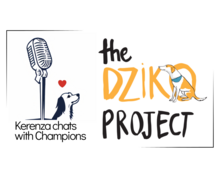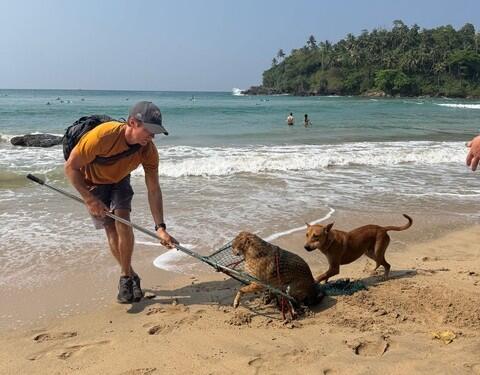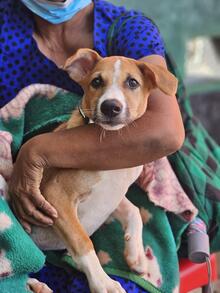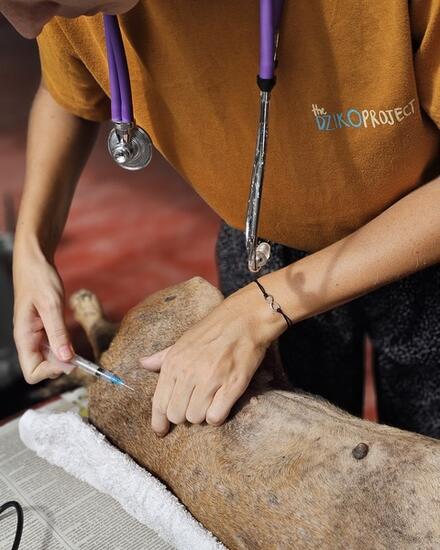Kerenza Chats with Champions: The Dziko Project in Sri Lanka

In this edition of Kerenza Chats with Champions, I speak with Rosie, co-founder of The Dziko Project. This organisation works at grassroots level to support dog welfare, rabies prevention, and rabies elimination in southern Sri Lanka. From humble beginnings in Zambia and Malawi to establishing impactful community programmes in Sri Lanka, Rosie shares The Dziko Project’s journey. She also discusses some of the challenges of working across cultures, and the power of persistence.
1. Kerenza: Let us start at the beginning. How did The Dziko Project come to life, and where does the name come from?
Rosie: The Dziko Project actually began as a passion project in Zambia, where a friend and I were travelling. We kept noticing the poor condition of street and village dogs: many of them malnourished, overbred, and unvaccinated. The turning point came in Malawi, when we met a free-roaming beach dog named Dziko. He was full of life and joy. “Dziko” means “wild” in Chichiwe, the local language. That name stuck with us and perfectly captured the spirit of the dogs we hoped to help - resilient, free, and overlooked. We officially registered the Dziko Project in 2022, and I have since continued the work in Sri Lanka, where the need has been immense.

2. Kerenza: What are the biggest rabies-related or cultural challenges you have faced while working in Sri Lanka?
Rosie: We mainly work in communities that usually have limited or no access to vet care. This means that we cover vast areas and need to provide a multitude of services to help support the communities, while also providing lifesaving educational information. One major issue is the reluctance to neuter male dogs. Many owners humanize their pets and view neutering as taking away their masculinity or natural sex drive. Even when we explain the health benefits or the risks of not neutering (like transmissible venereal tumours (TVTs) people often pull out at the last moment. Language barriers compound the issue, since we are mostly expat volunteers relying on a local tuk tuk driver or friends to help translate. To overcome this, we are currently developing simple educational materials in Sinhala, including graphic visuals of TVTs to support our message.
3. Kerenza: What is The Dziko Project approach to rabies prevention? Do you run separate campaigns or integrate vaccinations into other work?

Rosie: Our approach is integrated. Whenever we sterilize a dog, we also vaccinate against rabies and include a DHPP shot (distemper, hepatitis, parainfluenza, and parvovirus vaccine) for broader protection. We also include parasite treatment if needed. Recently, we had a big distemper outbreak, so we started including that as part of our core package as well. We have done some targeted vaccinations when rabid dogs are reported in areas (some with no access to veterinary care), but we are still a small team and rely on close collaboration with local vets. The GARC rabies tracking tools have been a huge help to us since they offer great visual feedback and make data collection easier for us. This has been critical because we are juggling so much.
4. Kerenza: You mentioned working in communities that might not usually have access to vet care. Can you describe a success story that’s stayed with you?
Rosie: Absolutely. One case that really touched us involved a severely neglected dog suffering from a massive TVT, as well tick bite fever in dogs, also known as canine babesiosis. He was chained up, skeletal, and barely had access to water. We started visiting him regularly, treating him while also educating the family on how to be responsible dog owners. Over several weeks, the transformation was incredible! He went from being a forgotten dog to a beloved pet who now roams freely. He is healthy and adored. That family even started referring others in the community to us. It showed how one-on-one education and trust-building can change an entire community’s attitude towards pet care. We may be small, but that ripple effect is powerful.
5. Kerenza: What’s next for the Dziko Project? How can GARC’s resources help support your goals?
Rosie: Our focus remains on sterilization and vaccination, with a growing emphasis on education. We would love to expand our work into more remote inland areas, where thousands of dogs have gone without care for years. As always, funding remains a barrier, but the GARC tools make it easier to visualize our work and prove the impact that we are having. We also hope to collaborate on translating more materials into local languages. If we can keep empowering both guardians and communities, we truly believe we can build a safer, more compassionate environment for both people and animals.
Follow The Dziko Project on Facebook and Instagram, and visit their website to learn more or support their mission.
The Communities Against Rabies initiative is supported by Battersea Dogs and Cats Home.
